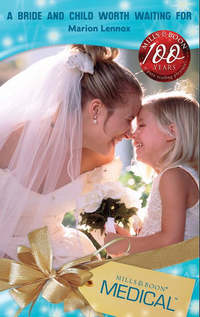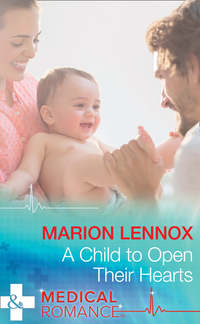
Полная версия
Falling For Her Wounded Hero
She faltered then, but forced herself to go on. ‘Like...like turning off life support,’ she whispered. ‘Like accepting what is or isn’t possible and not attempting useless heroics. Tom, I don’t trust myself but Paul said I could trust you. He spoke of you with affection. You’re the only one I could think of.’
And what was he to say to that?
There was only one answer he could give.
‘Of course I’ll be your advocate,’ he told her. ‘Or your support person. Tasha, whatever you need, I’ll be there for you. You have my word.’
‘But you hardly knew Paul.’
‘Paul’s family and so are you,’ he said, and he reached out and took her hands again. ‘That’s all that matters.’
* * *
‘Hilda?’
Hilda Brakenworth, Tom’s housekeeper, twin of Rhonda, answered the phone with some trepidation. She’d just finished making beef stroganoff and was contemplating the ingredients for a lemon soufflé. ‘Make it lovely,’ Tom had told her before he’d left for work. ‘Alice will be here at eight, just in time for sunset. Can you set the table on the veranda? Candles. Flowers. You know the drill.’
She did, Hilda thought dourly. Tom’s idea of a romantic evening never changed. But she was used to his priorities. Medicine came first, surfing second. His love life came a poor third, and the phone call she was receiving now would be like so many she’d received in the past. ‘Change of plan,’ he’d say and her dinners would go into the freezer or the trash.
‘Yes?’ she said, mentally consigning her lemon soufflé to oblivion.
‘Change of plan. I’ve invited a guest to stay.’
This was different. ‘You want a romantic dinner for three?’
He chuckled but Hilda had known him for a long time. She could hear strain in his voice—strain usually reserved for times when the medical needs of the community were overwhelming.
But did a guest staying warrant stress? She needed to phone Rhonda and find out what was going on.
‘I’ll put Alice off,’ he said. ‘She’ll understand.’
No, she won’t, Hilda decided, thinking of the beautifully groomed, high-maintenance Alice, but she didn’t comment.
‘Do you want me to make up the front room?’
‘I... Yes. And could you put flowers in there?’
‘It’s a woman?’
‘It’s a woman called Tasha.’ He hesitated and then he told it like it was. ‘She’s my half-brother’s widow and she’s in trouble. I’m hoping she’ll stay as long as she needs us.’
* * *
Cray Point was a tiny, seemingly forgotten backwater, a village on a neck of land stretching out from Port Philip Bay.
‘It’s one high tide away from being an island, but the medical emergency chopper can get here from Melbourne within half an hour,’ Tom told her. ‘Your Caesarean’s booked in a week and you’re not due for two weeks. We’re both doctors. We can surely detect early signs of labour and get you to the city fast.’
So a couple of hours after she’d arrived she was on the veranda, trying to eat the beautiful dinner Tom’s housekeeper had prepared.
Somewhat to her surprise she did eat. She’d looked at the meal and felt slightly nauseous, which was pretty much how she’d felt since that appalling last consultation with the cardiologist, but Tom had plonked himself down beside her, scooped stroganoff onto both their plates and directed her attention to the surf.
‘It’s too flat tonight,’ he told her. ‘It’s been great all day but the wind’s died and the waves have died with it. That’s the story of my life. I sweat all day trying to finish but the moment my patients stop appearing, so do the good waves. Dawn’s better but once I hit the water I forget what I’m booked for. So I have a great time and come in to find Rhonda ready to have my head on a platter and the waiting room bursting at the seams.’
‘Rhonda...’
‘Rhonda’s my receptionist. She and Hilda—she’s the housekeeper you just met leaving—are sisters. They rule my life.’
‘So no family? No wife and kids?’
‘With my family history?’ He grinned, a gorgeous, engaging grin that reminded her a little of Paul. ‘Paul must have told you about my dad. He did the right thing twice in that he married my mum and then Paul’s mother when they were pregnant, but he never stayed around long enough to be a father. He fancied the idea of his sons as his mates but the hard yards were done by our mums, and while they were raising us he went from woman to woman.’
‘You think that’s genetic?’
He grinned again. ‘I reckon it must be. Dating’s fun but I’m thirty-four years old and I’ve never met a woman I’d trust myself to commit to spending the rest of my life with.’ His smile faded. ‘But, unlike Dad, I won’t make promises I can’t keep. This life suits me. Mum was born and raised in Cray Point and this community nurtured both of us when Dad walked out on her. I left to do medicine but it’s always called me home. The surf’s great and the wind here in winter is enough to turn me into a salted kipper. I have a theory that the locals here don’t age, they just get more and more preserved. If you dig up the graveyard you’ll find old leather.’
‘That sounds like you have nothing to do as a doctor.’
‘Preserved leather still falls off surfboards,’ he said, and the smile came back again. ‘And tourists do dumb tourist things. I had a lady yesterday who rented a two-bedroom house for an extended family celebration and wanted it beautifully set up before they arrived. So she blew up eight air beds. On the seventh she started feeling odd but she kept on going. Luckily her landlady dropped in as she keeled over on the eighth. Full infarct. We air ambulanced her to Melbourne and she should make a good recovery but it could have been death by airbed. What a way to go.’
And for the first time in days—weeks?—months?—Tasha found herself chuckling and scooping up the tasty stroganoff. This man may well be a charming womaniser like his father and brother, but at least he was honest about it, she thought. And that side of him didn’t affect her. Just for the moment she could put tragedy aside.
As she ate he kept up a stream of small talk, the drama of being a small-town doctor in a town where access could be cut in a moment. As a doctor she found her interest snagged.
‘We can’t rely on the road,’ Tom told her as he attacked some lemon soufflé. ‘It floods. It also takes one minor traffic accident or one broken-down car to prevent access for hours or even days. As a village we’re pretty self-reliant and the medical helicopter evac team is brilliant. You sure you don’t want more of this?’
‘I... No.’ She’d surprised herself by eating any at all.
‘We’ll feed you up for the next week,’ Tom said calmly. ‘You and Emily. Did you know there are studies that say taste comes through? This is a truly excellent lemon soufflé. Who’s to say that Emily isn’t enjoying it, too?’
It was an odd thought. Unconsciously her hands went to her belly, and Tom’s voice softened.
‘Cuddling’s good,’ he told her. ‘I bet she can feel that as well, and I know she can hear us talking.’
‘She might...’ Her voice cracked. ‘But the doctor said...’
‘I know what’s been said,’ Tom told her, and his hand reached over and held hers, strong and firm—a wash of stability in a world that had tilted so far she’d felt she must surely fall. ‘But, Tasha, your baby’s alive now. She’s being cuddled. She’s sharing your lemon soufflé and she’s listening to the surf. That’s not such a bad life for a baby.’
It was a weird concept. That Emily could feel her now...
And suddenly Emily kicked, a good solid kick that even Tom could see under her bulky windcheater. They both looked at the bulge as Emily changed position, and something inside her settled. The appalling maelstrom of emotions took a back seat.
She was here overlooking the sea, feeding her baby lemon soufflé. It was true, Emily could hear the surf—every book said that babies could hear.
‘Maybe you could take her for a swim tomorrow,’ Tom suggested. ‘Lie in the shallows and let the water wash over you—and her. She’ll feel your body rocking and she’ll hear the water whooshing around. How cool would that be, young Emily?’
And he got it.
She looked up at him in stupefaction but Tom was gazing out to sea again, as if he’d said nothing of importance.
But he’d said it.
How cool would that be, young Emily?
No matter how short Emily’s life would be, for now, for this moment, Emily was real. She was her own little person, and with that simple statement Tom was acknowledging it.
The tangle of grief and fear and anger fell away. It was there for the future—she knew that—but for now she was eating lemon soufflé and tomorrow was for tomorrow. For now Emily was alive and kicking. She had no need for her faulty heart. She was safe.
And for the moment Tasha felt safe, too. When Tom had suggested staying she’d thought she’d agree to one night, when she could get to know him so she could figure whether she really could trust him to be her advocate. She knew if the birth was difficult and there were hard decisions to be made then she’d need a friend.
And suddenly she had one.
Thank you, Paul, she thought silently, and it was one of the very few times when she’d thought of Paul with gratitude. He had pretty much been the kid who never grew up, a Peter Pan, a guy who looked on the world as an amazing adventure. His love of life had drawn her in but she hadn’t been married for long before she’d realised that life for Paul was one amazing adventure after another. Putting his life at risk—and hers too if the need arose—was his drug of choice.
And as for Tom saying his father’s womanising was a genetic fault...yeah, Paul had pretty much proved that.
But now... He’d died but he’d left his sperm and it seemed he’d also left her a link to a man who could help her. Tom might be a womaniser like his brother. He might be any number of things, but right now he was saying exactly what she needed to hear. And then he was falling silent, letting the night, the warmth, the gentle murmur of the sea do his talking for him.
She could trust him for now, she thought, and once more her hands tightened on her belly.
She could trust this man to be her baby’s advocate.
And her friend?
* * *
By the time dinner ended Tasha looked almost asleep. Tom had shown her to his best spare room and she hit the pillow as if she hadn’t slept for a month. As maybe she hadn’t.
Tom checked on her fifteen minutes after he’d shown her to her bedroom. He knocked lightly and then opened the door a sliver. He’d thought if she was lying awake, staring at the ceiling, he could organise music or maybe a talking book.
She was deeply asleep. Her soft brown curls were splayed out over the pillows and one of her hands was out from under the sheets, stretched as if in supplication.
She hadn’t closed the curtains. In the moonlight her look of appalling fatigue had faded.
She looked at peace.
He stood and looked at her for a long moment, fighting a stupid but almost irresistible urge to stoop over the bed and hold her. Protect her.
It was because she was family, he told himself, but he knew it wasn’t.
Impending tragedy? Not that either, he thought. In his years as a country doctor he’d pretty much seen it all. Experience didn’t make him immune. When this community hurt, he hurt, but he could handle it.
He wasn’t sure he could handle this woman’s hurt.
And it wasn’t being helpful, staring down at her in the moonlight. It might even be construed as creepy. Like father, like son? He gave himself a fast mental shake, backed out and closed the door.
He headed to his study. Tasha had handed her medical file to him diffidently back at the surgery. ‘If you’re going to be our advocate you need to know the facts.’
So he hit the internet, searching firstly for the combination of the problems in Emily’s heart and then on the background of the paediatric cardiologist who had her in his charge.
The information made him feel ill. He was trawling the internet for hope, and he couldn’t find it.
He rang a friend of a friend, a cardiologist in the States. He rang another in London.
There was no joy from either.
In the end he headed back out to the veranda. This was a great old house, slightly ramshackle, built of ancient timber with a corrugated-iron roof and a veranda that ran all the way around. It was settled back from the dunes, overlooking the sea. The house had belonged to his grandparents and then his mother. It was a place of peace but it wasn’t giving him peace now.
This child was what...his half-niece? He’d scarcely known Paul and he’d only just met Tasha. Why should this prognosis be so gut-wrenching?
He couldn’t afford to get emotional, he told himself. Tasha needed him to be clear-headed, an advocate, someone who could stand back and see the situation dispassionately.
Maybe she should find someone else.
There wasn’t anyone else—or maybe there was, but suddenly he knew that even if there was he wouldn’t relinquish the role.
He wanted to be by her side.
Her image flooded back, the pale face on the pillow, the hand stretched out...
It was doing his head in.
It was three in the morning and he had house calls scheduled before morning’s clinic.
‘That’s the first thing to organise,’ he said out loud, trying to find peace in practicality. At least that was easy. Mary and Chris were a husband-and-wife team, two elderly doctors who’d moved to Cray Point in semi-retirement. They’d helped out in an emergency before and he knew they would now.
‘Because this is family,’ he said out loud, and the thought was strange.
The woman sleeping in his guest room, the woman who looked past the point of exhaustion, the woman who was twisting his heart in a way he didn’t understand...was family?
CHAPTER TWO
Eighteen months later...
THE SURF WAS EXTRAORDINARY. It was also dangerous. The wind had changed ten minutes ago, making the sea choppy and unpredictable.
The morning’s swells had enticed every surfer in the district to brave the winter’s chill, but a sudden wind change had caught them by surprise. The wind was now catching the waves as the swell rolled out again, with force that had wave smashing against wave.
Most surfers had opted for safety and headed for shore, but not Tom. There were three teenagers who hadn’t given up yet, three kids he knew well. Alex, James and Rowan were always egging themselves on, pushing past the limits of sensible.
As the wind had changed he’d headed over to them. ‘Time to get out, boys,’ he’d told them. ‘This surf’s pushing into the reef.’
‘This is just getting exciting,’ Alex had jeered. ‘You go home, old man. Leave the good stuff for us.’
They were idiots, but they were kids and he was worried. He’d backed off, staying behind the breakers while he waited for them to see sense.
Maybe he was getting old.
He was thirty-six, which wasn’t so old in the scheme of things. Susie was coming to dinner tonight and Susie was gorgeous. She was thirty-seven, a divorcee with a couple of kids, but she looked and acted a whole lot younger.
If she was here she’d be pushing him to ride the waves, he thought, instead of sitting out here like a wuss.
He glanced at the kids, who were still hoping for a clean wave. Idiots.
Was it safe to leave them? He still had to walk up to the headland before dinner, to take this week’s photograph for Tasha.
And that set him thinking. He’d promised the photographs but were they still needed? Was anything still needed? She didn’t say. He tried to write emails that would connect as a friend, but her responses were curt to the point of non-existent.
Maybe he reminded her of a pain that was almost overwhelming.
Maybe he was doing it for himself.
For Tom had stayed at Tasha’s side for all of Emily’s short life and it still seemed natural to keep tending her grave. In the few short days he’d helped care for the baby girl, she’d twisted her way around his heart.
But if Emily’s death still hurt him, how was Tasha doing? She never said.
Suddenly, lying out behind the breakers, overseeing idiots taking risks, he had a ridiculous urge to take the next plane and find out.
Which was crazy. He was Tasha’s link to her baby, nothing more, and she probably no longer wanted that.
But then he needed to stop thinking of Tasha.
A massive swell was building behind him, and the wind was swirling. He glanced towards the shore and saw the wave that had just broken was surging back from the beach. It was almost at a right angle to the wave coming in.
But the teenagers weren’t looking at the beach. They were staring over their shoulders, waiting for the incoming wave.
‘No!’ He yelled with all the power he could muster. ‘It’ll take you onto the reef. No!’
The two boys nearest heard. Alex and James. They faltered and let the wave power under them.
But Rowan either hadn’t heard or hadn’t wanted to hear. He caught the wave with ease and let its power sweep him forward.
It was too late to yell again, for the outgoing wave was heading inexorably for them all. For Tom and Alex and James it was simply a matter of head down, hold fast, ride through it. For Rowan, though... He was upright on the board when the walls of water smashed together.
The reef was too close. Rowan was under water, caught by his ankle rope, dragged by the sheer force of the waves.
He was on the reef.
Tom put his head down and headed straight for him.
* * *
There was no email.
Every Sunday since she’d returned to England Tom had sent an email, and there wasn’t one now.
At first she wasn’t bothered. Tom was a lone medical practitioner. Things happened. He’d send it later.
He didn’t...and so she went to bed feeling empty.
Which was stupid.
It had been eighteen months since Emily’s death. She’d left Australia as soon as the formalities were over, desperate to put the pain behind her. She hadn’t had the energy to head back to her work with Médicins Sans Frontières. Instead she’d taken a job in an emergency department in London and tried to drown herself in her job.
Mostly it was okay. Mostly she got to the end of the day thinking she could face the next.
And Tom’s emails helped. He sent one every Sunday, short messages with a little local gossip, snippets of his life, his latest love interest, any interesting cases he’d treated. And at the end he always attached a photograph of Emily’s grave.
Sometimes the grave was rain-washed, sometimes it was bathed in sunshine, but it was always covered in wildflowers and backed by the sea. He’d promised this on the day of the funeral and he’d kept his word. ‘I’ll look after this for you, Tasha. I’ll look after it for Emily and I’ll always make sure you can see it.’
It hurt but still she wanted it. She usually sent a curt thank you back and felt guilty that she couldn’t do better.
For Tom had been wonderful, she conceded. He’d been with her every step of the way during that appalling time.
It had been Tom who’d intervened when various specialists had decreed Emily needed to be in ICU, saying that spending time with her mother would decrease her tiny life span. Tom had simply looked at them and they’d backed off.
It had been Tom who’d organised discreet, empathic photographers, who’d put together her most treasured possession—an album of a perfect, beautiful baby being held with love.
It had been Tom who’d taken her back to Cray Point, who’d stood beside her during a heartbreaking burial and then let her be, to sit on the veranda and stare out at the horizon for as long as she’d needed. He’d been there when she’d felt like talking and had left her alone when she’d needed to be alone.
And when, three weeks after Emily’s death, she’d woken one morning and said she needed to go back to London, she needed to go back to work, he’d driven her to the airport and he’d hugged her goodbye.
She’d felt as if leaving him had been ripping yet another part of her life away.
But his emails had come every Sunday, and he was seemingly not bothered that she could hardly respond.
‘So what?’ she demanded of herself when there was still no email the next morning. ‘Tom was there when you needed him but it’s been eighteen months. You can’t expect him to photograph a grave for the rest of his life.’
Could she move on, too?
And with that came another thought. The idea had seeped into her consciousness a couple of months ago. It was stupid. She surely wasn’t brave enough to do it, but once it had seeded in her brain the longing it brought with it wouldn’t let her alone.
Could she try for another baby?
What would Tom think? she wondered, and her instinctive question was enough to make her stop walking and blink.
‘Tom’s not in the equation,’ she said out loud, and the people around her cast her curious glances.
She shook her head and kept going. Of course Tom wasn’t in the equation.
‘It’s good that the contact’s finally over,’ she told herself, but then she thought of Emily’s grave at Cray Point and knew that part of her heart would always be there.
With or without Tom Blake.
CHAPTER THREE
Six weeks later...
TODAY HAD BEEN an exhausting shift in the emergency department of her London hospital. The hospital was on the fringe of a poor socio-economic district, where unemployment was rife and where the young didn’t have enough to do. The combination was a recipe for disaster and the disasters often ended up in Tasha’s care.
She’d had two stabbings this shift. She was emotionally wiped—but, then, she thought as she changed to go home, she wanted to be emotionally wiped. She wanted to go home exhausted enough to sleep.
She’d hardly slept for weeks. Why?
Was it because the emails had stopped?
It was her own fault, she thought. She hadn’t made it clear she was grateful, because a part of her wasn’t. Tom’s emails were a jagged reminder of past pain. She didn’t want to remember—but neither did she want to forget.
And now Tom had obviously decided it was time to move on. She should be over it.
Could she ever be over it? She stared at her reflection in the change-room mirror and let her thoughts take her where they willed. How to move on?
Part of her ached for another baby, but did she have the courage?
‘Tasha? You have visitors.’ Ellen, the nurse administrator, put her nose around the door. ‘Two ladies are here to see you. They arrived two hours ago. They wouldn’t let me disturb you but said as soon as you finished your shift could I let you know. I’ve popped them into the counselling room with tea and biccies. They seem nice.’
‘Nice?’
Emergency departments saw many tragedies. Often family members came in, days, weeks, sometimes months after the event to talk through what had happened. Ellen usually pre-empted contact by finding the patient file and giving her time to read it. It helped. For doctors like Tasha, after weeks or months individual deaths could become blurred.
But Ellen wasn’t carrying a file and she’d described them as nice, nothing more.
‘It’s personal,’ Ellen said, seeing her confusion. ‘They say it’s nothing to do with a patient. They’re Australian. Hilda and Rhonda. Middle-aged. One’s knitting, the other’s doing crochet.’
Hilda and Rhonda.
She stilled, thinking of the only two Australians she knew who were called Hilda and Rhonda.
‘Shall I tell them you can’t see them?’ Ellen asked, watching her face. ‘I’m sure they’ll understand. They seem almost nervous about disturbing you. One word from me and I suspect they’ll scuttle.’
Did she want them to...scuttle?
No. Of course she didn’t.
For some reason her heart was doing some sort of stupid lurch. Surely something wasn’t wrong? With Tom?








